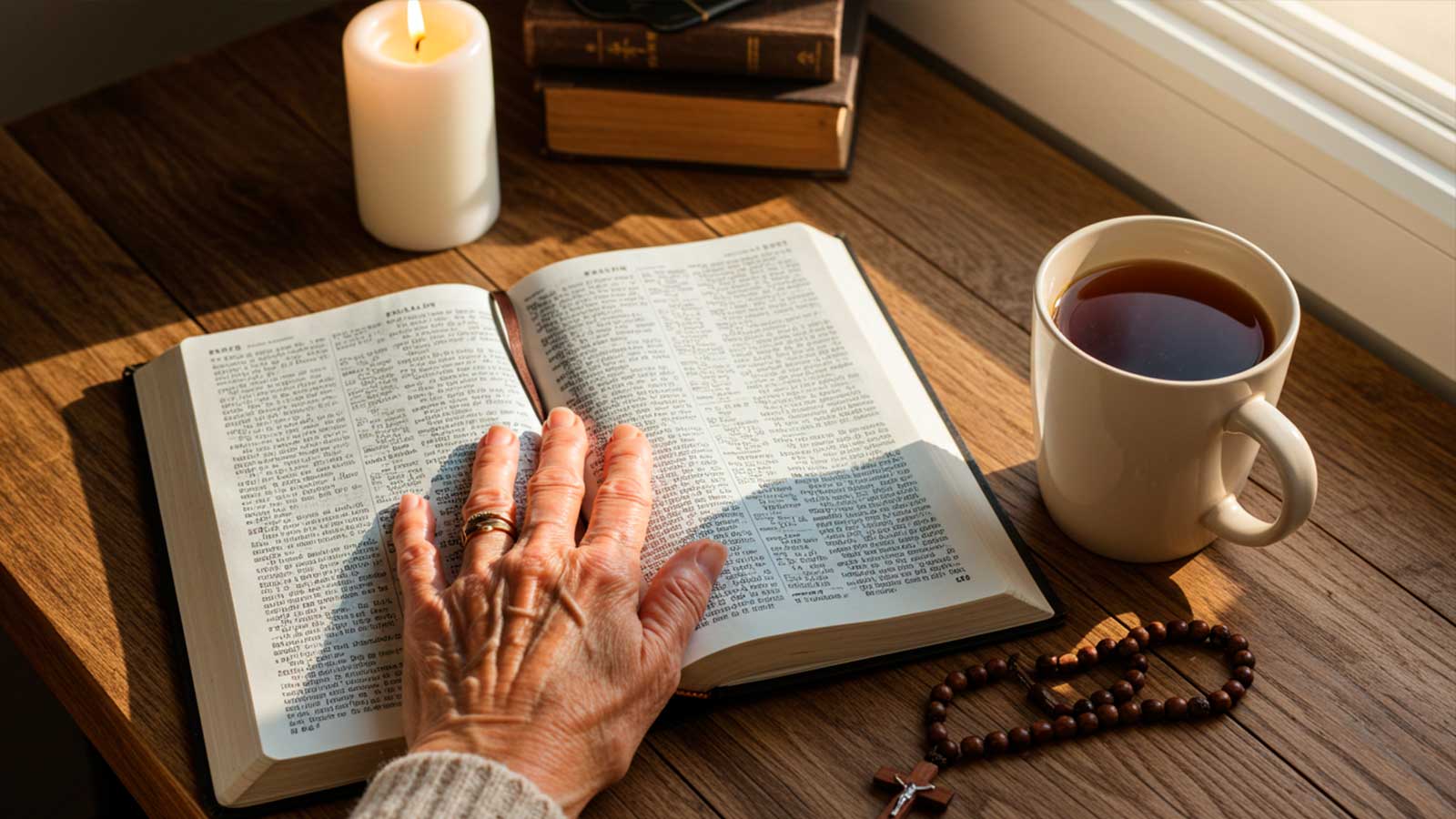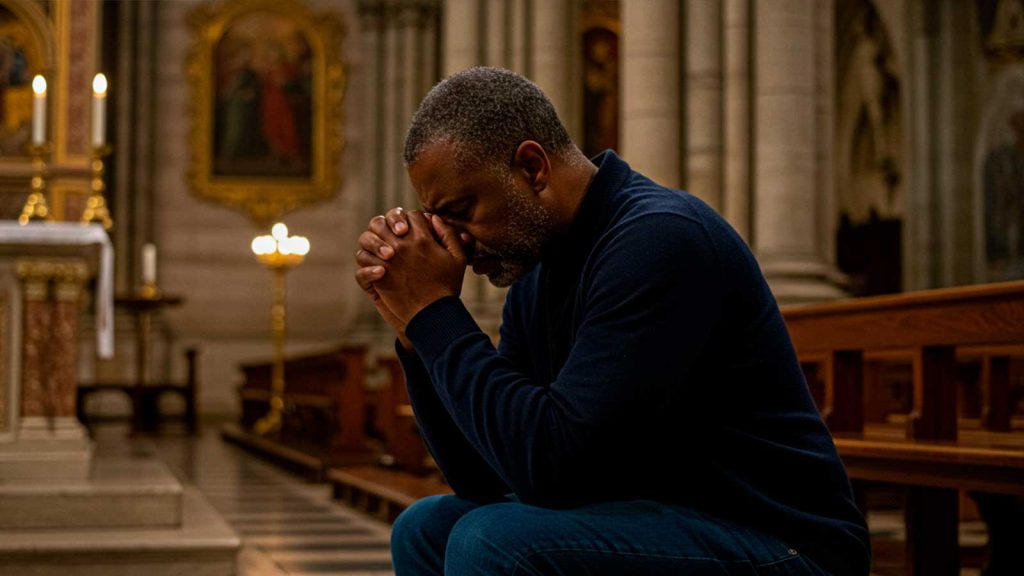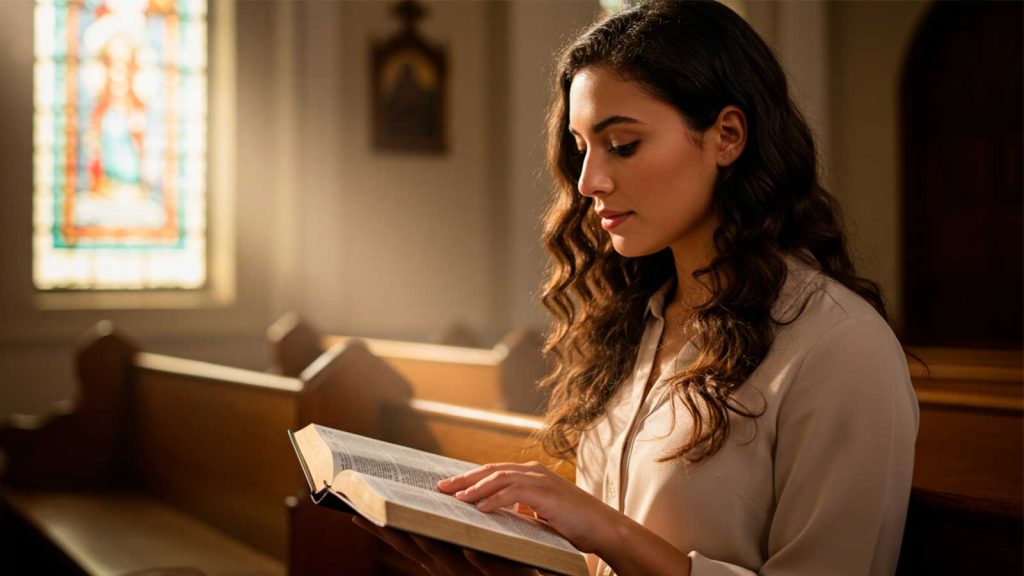The Psalm 20 is a powerful declaration of faith and trust in God when facing the challenges of life. It is traditionally attributed to King David and is known as a psalm of supplication, recited before great battles or times of trial.
In exploring this text, we discover not only a royal prayer but also a source of inspiration for all who seek protection and victory based on divine trust.
Complete Psalm 20
¹ May the Lord hear you on the day of distress, may the name of the God of Jacob protect you.
² May He send help to you from His sanctuary and support you from Zion.
³ May He remember all your offerings, and accept your burnt sacrifices. (Selah.)
⁴ May He grant you according to your heart’s desire, and fulfill all your plans.
⁵ We will rejoice in your salvation, and in the name of our God we will raise banners; may the Lord fulfill all your petitions.
⁶ Now I know that the Lord saves His anointed; He will hear him from His holy heaven with the saving power of His right hand.
⁷ Some trust in chariots and others in horses, but we will mention the name of the Lord our God.
⁸ Some bow down and fall, but we will rise and stand firm.
⁹ Save us, Lord; may the king hear us when we call out.
The Importance of Psalm 20 in the Life of a Christian
Psalm 20 is not only a biblical passage but also a deep expression of the faith of those who understand that true security comes from the Lord. In times of war, doubt, or affliction, it becomes a cry for divine intervention, strengthening the spirit and renewing hope.
A Song of Preemptive Victory
When reading Psalm 20, we perceive an inherent certainty that God will hear the prayer. It is as if the victory is already expected—not by human merit but through the power of the Most High. This invites us to cultivate a mature faith, one that is able to trust even without seeing immediate results.
A Blessing Pronounced by the Community
The psalm is written in the plural form and, therefore, is understood as an intercession of the people for their king. This characteristic underscores the value of collective prayer, where all unite with one purpose: to witness God’s action in favor of someone who leads or faces a battle.

Verse-by-Verse Explanation of Psalm 20
Verse 1
May the Lord hear you on the day of distress, may the name of the God of Jacob protect you.
This verse opens Psalm 20 with a deep wish that God hears the cry of the faithful in difficult times. The reference to the “God of Jacob” recalls God’s historical faithfulness to His people. Here, we see a prayer for the name—symbolizing the presence and power of God—to bring protection to the one in need.
Verse 2
May He send help to you from His sanctuary and support you from Zion.
The text invokes divine help coming directly from the heavenly sanctuary and from Zion, which represents the spiritual center of Israel. It is an expression of confidence in the supernatural help that comes from God rather than from circumstances.
Verse 3
May He remember all your offerings, and accept your burnt sacrifices. (Selah.)
Here, the prayer asks God to consider the king’s acts of devotion, such as sacrifices and offerings. “Selah” indicates a meditative pause—a call to reflect on the importance of faithfulness and the covenant with God.
Verse 4
May He grant you according to your heart’s desire, and fulfill all your plans.
This verse shows a trust in the desires and intentions of the faithful. There is an expectation that God will align personal plans with His will and carry them out according to the heart of the seeker.
Verse 5
We will rejoice in your salvation, and in the name of our God we will raise banners; may the Lord fulfill all your petitions.
The people express their anticipation of joy for the coming victory. “Raising banners” means hoisting flags in celebration. The faith already visualizes the answer even before it occurs, demonstrating active trust.
Verse 6
Now I know that the Lord saves His anointed; He will hear him from His holy heaven with the saving power of His right hand.
This is one of the most affirmative verses in Psalm 20. David confidently declares that God saves His chosen one. The right hand symbolizes power and authority, demonstrating that divine salvation is strong, effective, and sovereign.
Verse 7
Some trust in chariots and others in horses, but we will mention the name of the Lord our God.
This verse contrasts human trust with spiritual faith. While some place their hope in military power and material resources, God’s people place their faith in the Lord. It is a declaration of loyalty and submission to the true King.
Verse 8
Some bow down and fall, but we will rise and stand firm.
The consequence of the choice of where to place trust is revealed here. Those who trust in themselves stumble; those who trust in God remain steadfast. It is a clear reflection of spiritual strength versus human frailty.
Verse 9
Save us, Lord; may the king hear us when we call out.
Psalm 20 concludes with a direct plea. “Save us” is a collective cry, and “the king” can be interpreted either as David or as a reference to the sovereign God Himself. It is a plea for an answer and intervention on behalf of all the people.

Structure and Context of Psalm 20
This psalm is composed of nine verses, written in a language of exaltation and trust. Its content can be divided into three parts: supplication, certainty of answer, and glorification of God’s name.
Initial Verses: A Plea for Help
The opening of Psalm 20 brings direct appeals to God, crying out for protection, help, and the remembrance of the king’s offerings. Here, we learn that we can present our deeds, prayers, and sacrifices to God in faith, knowing that He responds.
Intermediate Verses: Declared Confidence
In the central part, there is a shift in the narrative—the focus now is on the conviction that God will answer from His sanctuary and grant victory. This transition demonstrates how faith transforms uncertainty into security.
Final Verses: Praise and Acknowledgment
The final part of Psalm 20 exalts God’s sovereignty and rejects reliance on earthly resources such as chariots and horses—symbols of military power in that era. The message is clear: true victory comes from the Lord.
Applications of Psalm 20 in Daily Life
Although it is an ancient psalm, its message is timeless. It can be applied to various situations in modern life, such as:
Moments of Decision
When we face major choices—whether at work, in relationships, or in life projects—Psalm 20 invites us to seek guidance and security in God’s will.
In the Midst of Spiritual Battles
Often, the battles are not physical but internal. Fears, doubts, and anxieties can be combated with prayer and meditation on this psalm, which reminds us that we are not alone.
Intercessory Support
Just as the people prayed for the king, we are called to intercede for our leaders, family, and friends. Reciting Psalm 20 in prayer for someone is an effective way to declare God’s blessing over their life.
The Power of Words in Psalm 20
The words used in this psalm are laden with strength and meaning. Terms such as “help,” “sanctuary,” “God’s name,” “horses,” and “chariots” are symbolic and connect us to a universe of divine protection versus limited human forces.
Trust in the Name of the Lord
In verse 7, we read: “Some trust in chariots, others in horses, but we will mention the name of the Lord our God.” This declaration sums up the spirit of the psalm: complete trust in God as the source of victory.
Prayer Before Action
Another valuable lesson is that the psalm is recited before the battle. This teaches us that before taking action, we must pray. Prayer prepares us, strengthens us, and aligns our will with God’s.

Historical Curiosities and Interpretations
Psalm 20 was used in public ceremonies before military campaigns, according to scholars. It is also part of the liturgical lectionary in several Christian and Jewish traditions.
Parallels with Other Psalms
There is a link between Psalm 20 and Psalm 21, which is considered a continuation. While the former is a prayer for victory, the latter is an expression of thanks for the victory achieved. This shows the beauty of the liturgical sequence and the spiritual process.
Final Reflection on Psalm 20
Psalm 20 reminds us that while we may cry out for help, our trust must be entirely placed in God. He is the one who listens, responds, and sustains. No matter the size of the battle, when we trust in the name of the Lord, we have peace even in the midst of war.
FAQ: Common Questions About Psalm 20
What is the main theme of Psalm 20?
The central theme is trust in God in the face of battle, focusing on prayer and the power of the Lord’s name.
Can Psalm 20 be used as a personal prayer?
Yes. Although it was originally a collective prayer, it can be recited in moments of seeking direction, strength, or deliverance.
What is the difference between Psalm 20 and other war psalms?
This psalm is unique in that it presents a secure expectation of victory even before the battle begins. It is a model of faith that precedes conquest.
Which verse is the most well-known in Psalm 20?
Verse 7 is one of the most quoted: “Some trust in chariots, others in horses, but we will mention the name of the Lord our God.”
Can I pray Psalm 20 for someone else?
Yes. It is ideal for intercession. It is an effective way to call upon God’s blessing over family, friends, and leaders.
READ ALSO:
- Psalm 19: The Harmony Between Nature and the Divine Word
- Psalm 18 Explained: God’s Fortress Amidst Battles
- Psalm 17: A Cry for Justice and Divine Protection
- Psalm 16: Discover the Depth of a Prayer
FOLLOW US ON FACEBOOK
Hope you enjoyed the explanation of Psalm 20